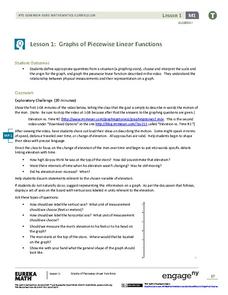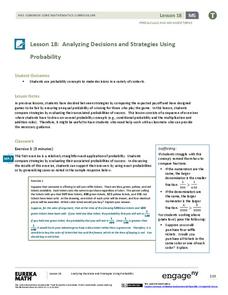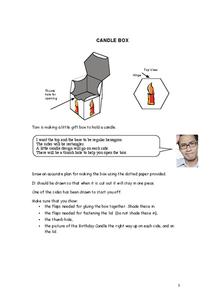EngageNY
Sampling Variability in the Sample Mean (part 1)
How accurate is data collected from a sample? Learners answer this question using a simulation to model data collected from a sample population. They analyze the data to understand the variability in the results.
EngageNY
Graphs of Piecewise Linear Functions
Everybody loves video day! Grab your class's attention with this well-designed and engaging resource about graphing. The video introduces a scenario that will be graphed with a piecewise function, then makes a connection to domain...
EngageNY
Types of Statistical Studies
All data is not created equal. Scholars examine the different types of studies and learn about the importance of randomization. They explore the meaning of causation and when it can be applied to data.
EngageNY
Sampling Variability in the Sample Proportion (part 2)
Increase your sample and increase your accuracy! Scholars complete an activity that compares sample size to variability in results. Learners realize that the greater the sample size, the smaller the range in the distribution of sample...
EngageNY
Margin of Error When Estimating a Population Mean (part 2)
Don't leave your classes vulnerable in their calculations! Help them understand the importance of calculating a margin of error to represent the variability in their sample mean.
EngageNY
Logarithms—How Many Digits Do You Need?
Forget your ID number? Your pupils learn to use logarithms to determine the number of digits or characters necessary to create individual ID numbers for all members of a group.
EngageNY
Exploiting the Connection to Cartesian Coordinates
Multiplication in polar form is nice and neat—that is not the case for coordinate representation. Multiplication by a complex number results in a dilation and a rotation in the plane. The formulas to show the dilation and rotation are...
EngageNY
Analyzing Decisions and Strategies Using Probability 1
Learn how to increase the probability of success. The 19th installment of a 21-part module teaches future mathematicians how to use probability to analyze decisions. They determine strategies to maximize the chances of a desired outcome.
West Contra Costa Unified School District
Solving Exponential Equations
The power to solve exponential equations lies in the resource. Scholars first learn how to solve exponential equations. An activity matching cards with equations, intermediate steps, and solutions strengthens this skill.
West Contra Costa Unified School District
The Power of Ten: Building a Magnitude Model
Add visual representation to teaching place value with a magnitude model. Using adding machine tape, pupils build a linear place value strip from 1 to 100.
Illustrative Mathematics
Overlapping Rectangle
Challenge young mathematicians' ability to compose and decompose shapes with this fun geometry puzzle. The goal is simple, locate all of the rectangles shown in a picture of three overlapping rectangles. Perform this activity as a whole...
Mathematics Assessment Project
Square
Don't be a square! Young mathematicians determine the slope and length of a line segment. They then prove whether four given coordinate points form a square.
Mathematics Assessment Project
Candle Box
Individuals draw a net for a hexagonal pyramid — with some stipulations. The net must contain the printed images so they appear correctly on the box, along with tabs to glue the box together.
Mathematics Assessment Project
Sorting Equations of Circles 2
How much can you tell about a circle from its equation? This detailed lesson plan focuses on connecting equations and graphs of circles. Learners use equations to identify x- and y-intercepts, centers, and radii of circles. They also...
Curated OER
Excel, Word, and Basketball
Wow, this lesson packs a punch. Pupils interview basketball players, write about a game, and use Excel to organize statistics related to the players and the points scored. Afterward, they create posters, presentations, and much more.
T. Smith Publishing
Halloween Add or Subtract
A jack-o-lantern containing a ghost top this page, making it a seasonal addition to your math lessons. On it, your little goblins will practice addition and subtraction of three-digit numbers. A terrific tool when working on Common Core...
Curated OER
Spelling Counts!
Play a game to practice spelling and math. By assigning a numerical value to each letter of the alphabet, you can engage learners in "spy" coding and decoding activities that reinforce grade-appropriate spelling and math skills....
Curated OER
Fraction Conversion Lesson Plan
Students practice converting fractions into decimals and percents using a computer applet and the concept of money.
EngageNY
Mid-Module Assessment Task: Grade 8 Module 7
Assess pupil understanding of rational and irrational numbers with a mid-module assessment that is the 15th lesson in the 25-part series. The questions represent the objectives in the first half of the series. Topics include decimal...
EngageNY
Mid-Module Assessment Task: Grade 8 Module 2
It's time for a concept check! Check for student understanding over the three types of rigid transformations. The assessment follows the first 10 lessons in this series and to test pupils' proficiency of these concepts. Individuals...
EngageNY
Interpreting Residuals from a Line
What does an animal's gestation period have to do with its longevity? Use residuals to determine the prediction errors based upon a least-square regression line. This second lesson on residuals shows how to use residuals to create a...
EngageNY
End-of-Module Assessment Task: Grade 7 Mathematics Module 6
Determine the level of understanding within your classes using a summative assessment. As the final lesson in a 29-part module, the goal is to assess the topics addressed during the unit. Concepts range from linear angle relationships,...
EngageNY
Read Expressions in Which Letters Stand for Numbers III
Those key operation words sure come in handy. Groups continue their work with converting between different notations for algebraic expressions. They work in stations to write the symbolic form for given verbal phrases. This is the 17th...
Mathematics Assessment Project
Solving Linear Equations
Linear equations are the focus of activities that ask learners to first complete a task that involves interpreting algebraic expressions and solving linear equations. They then take part in a card activity matching...

























